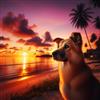1630s Dog Names - Page 2
Updated: July 10, 2024
Welcome to an enchanting page dedicated to the charm and magic of a bygone era. The 17th century, particularly the 1630s, was a time of great exploration, change and cultural evolution across the globe. This period was not only significant in terms of historical events and human names, but it also brought about unique trends in naming our four-legged friends.
Dive into this unique collection that serves as a time capsule, representing the spirit and style of that fascinating decade. The names you will find here have been meticulously curated, reflecting the classic, timeless appeal of that age. They echo the sounds, sentiments, and even the humor of the people living in the 1630s. These names carry the legacy of a rich past and offer a beautiful option for naming your beloved pet today.
Discover names that are filled with character and history, just like your pet. Whether you're seeking a name that's elegant, playful, or truly one-of-a-kind, this collection of 1630s-inspired dog names holds a treasure trove of choices. Enjoy the journey into the past as you seek the perfect name for your loyal companion.
| Name | Reason to Choose |
|---|---|
| Egbert | An old English name that continued being used in the 17th century |
| Eleazar | A biblical name that was well-liked during the 17th century |
| Elias | Frequently used name, stemming from the Bible |
| Elijah | A biblical name frequently used during this period |
| Ephraim | Resonates with the biblical names trend of the 1630s |
| Erastus | A unique biblical name that was popular during the 1630s |
| Esher | Takes its roots from the Bible, popular in the 1630s |
| Esther | Esther, a biblical name, was common in the 17th century |
| Ethelbert | Reflects the 17th-century interest in Old English names |
| Eunice | This name, biblical in origin, was prevalent in the 1630s |
| Ezekiel | A frequently used biblical name during the 1630s |
| Faith | Reflects the strong religious beliefs of the era |
| Felix | An often-used biblical name during this time |
| Ferdinand | The name of several European monarchs in the 17th century |
| Fidelity | Puritans often used virtue names for their pets |
| Gamaliel | This biblical name was popular in the 1630s |
| Geoffrey | A popular name in England during the 1630s |
| Gideon | A name with biblical connotations, common in the 1630s |
| Giles | A common name during the 17th century |
| Godfrey | A common name in England during the 17th century |
| Gregory | The name of several Popes and Saints in the 17th century |
| Habakkuk | This biblical name was preferred by many in the 1630s |
| Hagar | A biblical name that was common during the 17th century |
| Harold | Common name in England during the 17th century |
| Hector | Reminiscent of the epic tales popular in the 17th century |
| Hezekiah | Biblical names like this were popular during the 17th century |
| Honor | Another virtue name from the Puritan tradition |
| Hope | A virtue name from the Puritan tradition |
| Humphrey | A classic name popular in the 1630s |
| Ichabod | A name with a biblical background, common in the 1630s |
|
Suggest:
|
Submitted!
|
| 1 2 3 4 5 | |
Colonial Dog Names
| Name | Description |
|---|---|
| Adams | Honoring John Adams, a key figure in the American Revolution |
| Barnaby | Derived from an old English name, popular in the 1630s |
| Bradford | Named after William Bradford, a colonial governor |
| Bunker | Named after Bunker Hill, a key site in the colonial era |
| Charity | Puritan virtue name indicative of the era's moral standards |
| Chaucer | Named after the famous English poet, popular during the colonial era |
| Concord | Named after Concord, a significant town in colonial history |
| Faith | Reflects the strong religious beliefs of the colonial era |
| Hancock | Named after John Hancock, a prominent figure in the colonial era |
| Hester | Popular female name in the colonial period, indicative of its English roots |
| Humphrey | A common name in the colonial period, reflecting its English origins |
| Jamestown | Named after the first permanent English settlement in the New World |
| Liberty | Represents the fight for freedom during the colonial era |
| Mather | Named after Increase Mather, a prominent figure in the colonial era |
| Mayflower | Symbolizes the ship that brought the Pilgrims to the New World |
| Mercy | Derived from a popular Puritan virtue name |
| Patience | A virtue name common among Puritan settlers |
| Pilgrim | Represents the journey of the first settlers to the New World |
| Plymouth | Represents Plymouth Colony, the first successful English settlement |
| Pocahontas | Honoring Pocahontas, a Native American woman associated with the colonial settlement at Jamestown |
| Prudence | Reflects the Puritan virtue names of the 1630s |
| Revere | Honoring Paul Revere, a key figure in colonial history |
| Salem | Named after Salem, Massachusetts, a significant colonial town |
| Standish | Inspired by Myles Standish, a notable colonial military leader |
| Winslow | Inspired by Edward Winslow, a colonial leader |
|
Suggest:
|
Submitted!
|
Royal Dog Names
| Name | Description |
|---|---|
| Archduke | A title of the junior branch of the House of Habsburg that existed in the 1630s |
| Bishop | A senior member of the Christian clergy, typically in charge of a diocese and empowered to confer holy orders |
| Chamberlain | In the 1630s, a chamberlain was a high officer of the royal court |
| Coronet | A small crown consisting of ornaments fixed on a metal ring, used by the nobility in the 1630s |
| Crown | A universal symbol of royal authority |
| Duchess | It's a title for the wife or widow of a duke, a common title in the 17th century |
| Earl | A rank of the British peerage, standing above the rank of viscount and below marquess |
| Empire | A political unit having an extensive territory or comprising a number of territories or nations and ruled by a single supreme authority |
| Garter | The Order of the Garter was the highest order of knights in the 17th century |
| Jester | A common figure in royal courts during the 17th century |
| Knight | A title granted to men of noble birth in the 17th century |
| Monarch | In the 1630s, monarchy was the prevalent form of governance |
| Noble | It refers to a person of noble rank, which was highly respected in the 1630s |
| Page | In medieval times, a boy servant or attendant to a knight |
| Palace | A grand residence for a king, queen or bishop in the 1630s |
| Regalia | The emblems or insignia of royalty, such as the crown, scepter, and other ornaments used at a coronation |
| Regent | It relates to a person who rules in place of a king or queen, a common occurrence in the 1630s |
| Scepter | In the 1630s, scepters were symbols of royal power |
| Seneschal | In the Middle Ages, a steward or major-domo of a medieval great house |
| Sovereign | It means supreme ruler, a term often used for monarchs in the 1630s |
| Squire | In the Middle Ages, a young nobleman acting as an attendant to a knight before becoming a knight himself |
| Stuart | A Scottish royal house that held the English throne in the 1630s |
| Throne | It's where the monarch sits, a symbol of their power and status |
| Tudor | A royal house of Welsh origin, prominent in the 16th and 17th centuries |
| Viceroy | A ruler exercising authority in a colony on behalf of a sovereign |
|
Suggest:
|
Submitted!
|
Early Settlers Dog Names
| Name | Description |
|---|---|
| Barnaby | Named after Barnaby Rudge, a character in Dickens' novel, reflecting the love for literature among early settlers |
| Charity | A virtue name, common among Puritans, showcasing the importance of good deeds |
| Concord | Named after the Massachusetts town founded in the 1630s |
| Ebenezer | A biblical name, reflecting the strong religious beliefs of the settlers |
| Endurance | A virtue name, symbolizing the settlers' strength and perseverance |
| Fidelity | A virtue name, underlining the settlers' commitment to their principles |
| Gideon | A biblical name, denoting strength and resilience |
| Harvest | Symbolizing the importance of agriculture in the life of early settlers |
| Hester | Inspired by Hester Prynne, the protagonist of 'The Scarlet Letter', set in the 17th century |
| Huckleberry | Named after the native North American plant, symbolizing survival and adaptation |
| Humble | A virtue name, representing the modesty and simplicity of the settlers' life |
| Jedediah | A biblical name, popular among early settlers due to religious significance |
| Justice | A virtue name, reflecting the settlers' quest for fairness and equality |
| Mercy | A virtue name, common among Puritans |
| Myles | Named after Myles Standish, a prominent figure among early settlers |
| Orchard | Symbolizing the settlers' dependence on the land and nature |
| Patience | A virtue name, reflecting the patience needed during the challenging times faced by the settlers |
| Pilgrim | Reflecting the journey and hardships faced by the earliest settlers |
| Prudence | A virtue name, echoing the moral ideals of early settlers |
| Salem | Named after Salem, Massachusetts, a significant location in early American history |
| Silas | A biblical name, reflecting the settlers' deep faith |
| Sterling | Suggests high quality and excellence, traits admired by settlers |
| Verity | A virtue name, reflecting the importance of truthfulness in the settlers' community |
| Winslow | Named after Edward Winslow, a notable figure in the early Plymouth Colony |
| Zebulon | A biblical name, reflecting the settlers' religious beliefs |
|
Suggest:
|
Submitted!
|
Shakespearean Dog Names
| Name | Description |
|---|---|
| Balthasar | Drawn from 'The Merchant of Venice,' a play by Shakespeare |
| Benedick | A character from 'Much Ado About Nothing,' a play by Shakespeare |
| Brutus | A character from 'Julius Caesar,' a tragic play by Shakespeare |
| Cassius | A significant character from 'Julius Caesar,' a Shakespearean tragedy |
| Cordelia | A character from the play 'King Lear.' |
| Cymbeline | Inspired by the title of a lesser-known Shakespearean play |
| Desdemona | From 'Othello,' a famous Shakespearean play |
| Duncan | A character from 'Macbeth,' one of Shakespeare's darkest tragedies |
| Hamlet | Taken from the protagonist of one of Shakespeare's most famous tragedies |
| Horatio | A character from 'Hamlet,' a famous Shakespearean tragedy |
| Iago | A character from 'Othello,' a tragic play by Shakespeare |
| Laertes | A character in 'Hamlet' which is a popular Shakespearean play |
| Lear | Derived from 'King Lear,' a renowned Shakespearean tragedy |
| Lysander | A character from 'A Midsummer Night's Dream,' a play by Shakespeare |
| Mercutio | A character in 'Romeo and Juliet,' a romantic tragedy by Shakespeare |
| Oberon | Inspired by a character from 'A Midsummer Night's Dream,' a Shakespearean comedy |
| Orlando | A character from 'As You Like It,' a comedic play by Shakespeare |
| Othello | Inspired by the title character of a Shakespearean tragedy |
| Portia | From 'The Merchant of Venice,' a romantic comedy by Shakespeare |
| Puck | A mischievous character from 'A Midsummer Night's Dream,' a comedy by Shakespeare |
| Romeo | The male protagonist from 'Romeo and Juliet,' a renowned Shakespearean tragedy |
| Rosalind | A leading character in 'As You Like It,' a Shakespearean comedy |
| Titania | A character from 'A Midsummer Night's Dream,' a play by Shakespeare |
| Viola | A character from 'Twelfth Night,' a comedy by Shakespeare |
| Yorick | A character from 'Hamlet,' one of Shakespeare's most renowned plays |
|
Suggest:
|
Submitted!
|
Puritan Dog Names
| Name | Description |
|---|---|
| Blessed | This name reflects the Puritan belief in divine favor and protection |
| Charity | Charity is an ideal name, embodying the Puritan value of love and benevolence |
| Chaste | This name reflects the Puritan emphasis on chastity and moral purity |
| Constant | A suitable name, embodying the Puritan value of steadfastness and loyalty |
| Earnest | Signifying seriousness or sincerity, this name reflects the Puritan's earnest approach to life |
| Faithful | Faithfulness was a cherished virtue in the Puritan society, making this a fitting name |
| Fervor | This name is inspired by the passionate intensity of Puritan beliefs |
| Grace | Grace is a perfect Puritan name, signifying the divine assistance given to humans for their regeneration |
| Hope | This name embodies the Puritan belief in the hope of salvation |
| Humble | Derived from the Puritan virtue of humility, a valued moral quality in the 1630s |
| Justice | Justice is a key principle in Puritan belief, making it an apt name |
| Mercy | Mercy, a common Puritan virtue, is a symbol of kindness and forgiveness |
| Modest | Modesty was a highly valued quality in the 1630s Puritan society |
| Noble | Reflecting high moral qualities, Noble is a suitable Puritan dog name |
| Patience | Patience was a highly valued virtue in 1630s Puritan society |
| Piety | Derived from the strong Puritan emphasis on religious devotion and reverence |
| Prudence | Prudence was a popular Puritan name emphasizing wise and cautious behavior |
| Purity | This name is inspired by the main principle of the Puritan movement - purity of worship and doctrine |
| Redeem | This name reflects the Puritan belief in redemption through faith |
| Saint | Saint reflects the Puritan's aspiration for a life of sanctity and virtue |
| Sincere | This name reflects the Puritan emphasis on sincerity in all aspects of life |
| Truth | Truth is a simple, yet powerful name reflecting the Puritan commitment to honesty |
| Verity | This name means 'truth', a virtue highly regarded by the Puritans |
| Virtue | A very straightforward name that captures the Puritan emphasis on moral excellence |
| Zeal | Zeal signifies great energy or enthusiasm, a trait often associated with Puritan preachers |
|
Suggest:
|
Submitted!
|
User Submitted Images
There are currently no user submitted images for this page. This is your opportunity to be the first! Submit your photo below.
User Recommendations
There are currently no name recommendations for this page. This is your opportunity to be the first! Make your recommendation below.
Recently Updated
We would like to take this time to thank all of our visitors that make DogNamed.com the best dog naming resource on the web. Our site would not be where it is today without your suggestions, ratings, and photo submissions. So pat yourselves on the back for a job well done and keep up the good work! If you have any comments, suggestions, or ideas for the this page or any part of our site, don't hesitate to drop us a line on our Contact Page. Thank you! -The DogNamed Team




























